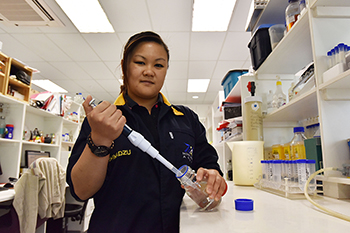Latest News Archive
Please select Category, Year, and then Month to display items
15 March 2022
|
Story Rulanzen Martin
|
Photo Supplied
 The keynote speakers are Dr Khabele Motlosa (right), Senior Lecturer in the Department of Political and Administrative Studies at NUL, and leading Pan-Africanist scholar Prof Molefi Kete Asante(left).
The keynote speakers are Dr Khabele Motlosa (right), Senior Lecturer in the Department of Political and Administrative Studies at NUL, and leading Pan-Africanist scholar Prof Molefi Kete Asante(left).
The
Centre for Gender and Africa Studies (CGAS) at the University of the Free State (UFS), together with the
National University of Lesotho (NUL) and the Academic Forum for Development of Lesotho, is hosting an online think tank on the transnational communities of the Lesotho-South Africa border from 19 to 21 March 2021. The theme of the conference is
Lesotho and South Africa: a clarion call for a Pan-Africanist future.
Dr Munyaradzi Mushonga, Programme Director: Africa Studies Programme in CGAS, is the convenor of the conference and is also leading the UFS borderlands panel. The borderlands project is jointly funded by the Office of the Dean: Faculty of the Humanities at the UFS, and the National Institute for the Humanities and Social Sciences (NIHSS).
For more information and to register for the conference, click here

The impact of personal care products on water resources in the Free State
2015-12-14

Jou-an Chen
Photo: Charl Devenish
|
Water is of the utmost importance in personal hygiene. Most people can hardly have a day go by without taking a shower in the morning and at night. However, it is this very habit that is increasingly polluting the water resources in South Africa.
Contaminants found in pharmaceutical and personal care products have been accumulating in water masses in recent years. These contaminants especially refer to hormones in medication, as well as colouring agents and fragrances used in soap, shampoo and body lotions.
“Little information and data are available on the prevalence of these contaminants, and on how high the level of pollution really is,” says Jou-an Chen, researcher in the Department of Microbial, Biochemical and Food Biotechnology at the UFS.
Her research particularly focuses on the prevalence and impact of those contaminants.
“Because these substances have not been properly investigated, we are not sure how widely it occurs and whether it is harmful to the environment. It was precisely the lack of information that has inspired me to investigate further.”
“If we could identify the contaminants and what it is doing to the environment, it could make a valuable contribution to directives on water quality standards.”